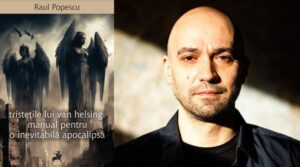„I shall call you tomorrow, when/ Not seeing you/ I shall imagine that/ You are still here, close by me,/ Tomorrow… when you are/ There, far away, behind/ A thin wall of winds,/ Of skies and years.”
(Pedro Salinas, „I Cannot See You”)
In the mid-1930s Residencia de Estudiantes was that privileged place in Madrid where not only students (Spanish or foreign) but also the artistic elite of the time, from Federico García Lorca, Rafael Alberti, Juan Ramón Jiménez, Miguel de Unamuno and Pedro Salinas to Salvador Dali, Pablo Picasso and Luis Buñuel, swarmed. A place of meetings and debate and equally so a cradle of Republican ideas, Residencia shortly became an undisputable intellectual (and political) hub impossible to overlook in the overly tormented years preceding the outbreak of the Spanish Civil War. And it is precisely here that the events and incidents that bear upon the lives of the protagonists of Susana Fortes’s novel „El amor no es un verso libre” („Love Is Not for Poets”) take place.
Born in 1959 in Pontevedra, Galicia, Susana Fortes taught at several universities in Spain and in the United States of America and her novels, from her debut one, „Querido Corto Maltés” (1994) to the ones that made her reputation as a fiction writer mastering both the technique of intricate thriller plot and the art of atmosphere and detail, namely „Las cenizas de la Bounty” (1998), „Fronteras de arena” (2001), „El azar de Laura Ulloa” (2006) or „Septiembre puede esperar” (2017), have been rewarded with prestigious awards of the Spanish literary world. Fascinated, as she herself confessed, by the ‘Madrid Bloomsbury Group’ atmosphere that animated the famous Residencia de Estudiantes, as well as by the complicated stories (of love and literature!) that started in it, the writer crafted, in „El amor no es un verso libre”, not only a painful love story, but also an extraordinary fresco of an entire age, with all its lights and shadows.
Susana Fortes’s novel is, however, a highly atmospheric text, as what lingers with the reader is Madrid, with its impressive boulevards but also with its unassuming side-streets, its peculiar scents, the hot air of summer days and the incomparable charm of the inhabitants and of the taverns on the outskirts, smelling of olives and wood-burning hearths. The big city itself thus becomes a truly symbolic character alongside the other characters in this book.
Thus, in the summer of 1935 Kate Moore arrives in Madrid from the United States, intent on completing her studies on Spanish culture and literature. Blonde, tall, beautiful and attracted by the Spain of knights errant that she has encountered only in books, driven by an incredible passion for literature, on her first day here Kate meets Professor Álvaro Diaz-Ugarte, who offers not only to guide her through the intricacies of Spanish poetry, but also to ease her familiarization with this new world fraught with contrasts. And, from conversations on literature and walks in the historical parts of Madrid, they are one step away from a passion that will be more powerful than their will, however hard they try to resist it. It is Diaz-Ugarte who also introduces young Kate to the cultural circles of Madrid, inviting her to several parties, where all eyes are inevitably riveted upon her. What is unforgettable is the moment when they dance, under the baffled stares of people more conservative than they would have wanted to seem, Kate reminiscent, in her ease and resplendence, of Natasha Rostova in „War and Peace…”: ‘He was aware that they should not be dancing like that, but he would just hold her more tightly, under a spell that made him yield to the rhythm of the music, as if he were willingly taking part in a ceremonial. He was perfectly aware that they were dancing against the whispers of the onlookers, but he never stopped to analyse the potential consequences of that dance upon his reputation. A married man. They never exchanged a word, just gazed at one another, in utter defiance of the stares of those around them, as if in a duel. When a waltz is danced like this, movements are not a choice, but a fatality. […] She shut her eyes and laid her head on his shoulder, in an attitude of surrender, like a prisoner. She stood like that for a second, far from everything. Diaz-Ugarte somehow sensed this abandonment.’
But things, already complicated from the very beginning (Álvaro is married and, moreover, dependent on the highly-placed connections of his father-in-law, who has had a major contribution to his entry into high society), take an even more complicated turn as Gabino Aguirre, a young resident of Residencia de Estudiantes, passionate about English poetry and a translator from Dante Gabriel Rosetti’s poetry, is murdered under strange circumstances, and Kate suddenly has the revelation of the existence, one step away from the glitter of the fashionable salons and the conversations on literature, of a universe that is dark, threatening, laden with secrets, inflicting suffering and death. And the book imperceptibly turns, from what is apparently a mere story of a forbidden passion, into an actual thriller, one not devoid of political accents – a ploy whereby Susana Fortes manages to give her readers lesser-known details about a tumultuous age in the not-so-remote history of Spain. For the writer puts together an amazingly interesting and telling background, depicting the spirit of the Second Republic, a time characterized by tensions that could hardly be reined in. The Asturias uprising, the bloody interventions of the political police and the great corruption scandals that stormed the country were topical, particularly the so-called Straperlo Scandal of the huge bribes taken by high-ranking officials in order to approve the rolling-out of the controversial electrical roulette machine devised by Daniel Strauss, the Jewish businessman of Dutch descent. Eventually, the Alejandro Lerroux Government resigned, precipitating the events and practically hastening the onset of Civil War. Although at first she thought she was far from these, sheltered in the world of the literature she so much loved, Kate finds herself involved, almost against her will, in a host of events that will carry her through various social environments and will even send her to prison for more than two months and, when she is finally released, she will discover that the entire world has changed and that the time for love has long gone. The intrigues, the scandals and, above all, the dark shadow of death will destroy the protagonists’ love story before they have fully lived it.
Published in 2003, the novel enjoyed huge success both with the reading public and with literary critics, all the more so as, in order to give more substance to her text, Susana Fortes made use of poetic images – moreover, she even started her novel with an epigraph – from Pedro Salinas’s poems: ‘I did not/ Meet you in the storm.’ The lines were not chosen at random and neither does Pedro Salinas’s name appear by accident, even before the narration actually starts. For, after all, in writing „El amor no es un verso libre” Susana Fortes gained inspiration from a detail less known even in the Spanish cultural circles, one which she re-contextualized and re-interpreted: the great love story between the very poet Pedro Salinas and Katherine Whitmore, the young American girl who arrived in Madrid in the 1930s to specialize in Spanish literature (in fact, Salinas’s love letters were published in Spain in 2002 and the book, entitled „Cartas a Katherine Whitmore”, got a huge resounding in the Spanish cultural space). Not incidentally, the protagonist’s name in Fortes’s book is Kate Moore… Included in „La voz a ti debida”/ „The Voice Thee Owed”, Salinas’s volume published in 1933 (a volume which – mention should be made – contains, as does „Razón de amor”/ „The Rationale of Love”, published in 1936, some of the most haunting love poems ever written in Spanish literature), the lines of the epigraph in Susana Fotres’s novel were inspired by, and dedicated to, the woman who had Pedro Salinas under her spell. And they confess not only to a devastating passion, but also to the foreboding of a fateful ending. Moreover, one of the characters in „El amor no es un verso libre” is Pedro Salinas himself – the great poet of a generation – who, years afterwards, when he finally made it to the United States, would recount for Kate a few significant moments in Diaz-Ugarte’s final days. Diaz-Ugarte who, although in love with Kate, had broken up with her, but who – as the American blonde woman would only find out years later – had made that painful choice precisely in order to save her life. ‘In fact, he had not had the courage to face a scandal. Love had become impossible, something extreme, placed on the thin line separating life from death. A man must have either the courage to stop in time or the courage to go all the way. He had had neither. It had been his limit.’
Susana Fortes’s novel is, however, a highly atmospheric text, as what lingers with the reader is Madrid, with its impressive boulevards but also with its unassuming side-streets, its peculiar scents, the hot air of summer days and the incomparable charm of the inhabitants and of the taverns on the outskirts, smelling of olives and wood-burning hearths. The big city itself thus becomes a truly symbolic character alongside the other characters in this book, as Kate Moore remembers Spain, even after many years, particularly on a sensory level, with its scents and colours, with the fragrance of the leaves in winter or of the grass on August days.
As always, big history governs the course of individual destinies and the social and political upheavals in the Spain of the 1930s ruthlessly shatter even the beautiful illusion of a possible redemption by love. A redemption which Kate, the protagonist of „El amor no es un verso libre”, will nevertheless experience by means of literature, albeit years later, preparing her lectures on Spanish poetry and reading to her students (or maybe just to herself), excerpts from the poetry of her beloved Álvaro: ‘Even now/ If someone told me, just like then/ Let us watch the sky at night/ From the solitary car/ To the knoll of dreams/ In the heart of Madrid/ With my eyes shut I would walk in the dark/ Hoping to find you there.’
Susana Fortes, „Love Is Not for Poets” („El amor no es un verso libre” / „Iubirea nu e un vers liber”), translated into Romanian by Cornelia Rãdulescu, Humanitas Fiction Publishing House, 2021
Translated into English by Mirela Petrașcu


























Scrie un comentariu